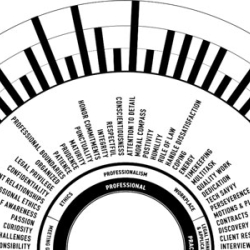Equity in Law School Admissions and Legal Hiring After Affirmative Action
 Though mired in controversy, there is little debate that the Supreme Court’s decision on affirmative action in college admissions will have far-reaching effects—including impacts on the legal profession. It will, of course, change the landscape of how law schools admit students. And, while the ruling is specific to college admissions, there is good reason to believe that employers will begin to shift toward less aggressive DEI-related hiring policies to preempt potential litigation.
Though mired in controversy, there is little debate that the Supreme Court’s decision on affirmative action in college admissions will have far-reaching effects—including impacts on the legal profession. It will, of course, change the landscape of how law schools admit students. And, while the ruling is specific to college admissions, there is good reason to believe that employers will begin to shift toward less aggressive DEI-related hiring policies to preempt potential litigation.
Of course, this is likely to work in service of the status quo. The legal profession is woefully lacking in diversity. In fact, data from the ABA shows that, among lawyers in the U.S., only about 5% are Black and only about 6% are Hispanic. This stands in stark contrast to the broader U.S. population, in which nearly 14% are Black and 19% are Hispanic. These trends have persisted, despite efforts in the last couple of decades to diversify the profession.
Still, those of us who remain steadfast in our commitment to creating diverse, inclusive educational and professional environments need not despair. As many have noted, there are viable paths forward for educational institutions and employers who wish to continue fostering equity and inclusion. In the context of the legal profession, IAALS’ Foundations for Practice work is poised to provide this critical guidance to educators and employers in this post–affirmative action era.
Foundations: A Brief Primer
In 2016, IAALS published the results of a national survey of lawyers aimed at gaining a better understanding of precisely what skills, knowledge, abilities, and qualities new lawyers need to succeed in the workplace. Ultimately, we received more than 24,000 responses from attorneys across the country, representing a broad array of practice settings, areas of expertise, and demographic backgrounds.
Working with four law schools—Columbia Law School, Northwestern Pritzker School of Law, Seattle University School of Law, and University of Denver Sturm College of Law—and an array of 34 legal employers—from Starbucks to New York City Legal Aid—we used this robust data to develop two sets of tools: one for law schools and legal educators to use in guiding law school curriculum and one for legal employers to use in hiring.
These tools—along with the many innovative ways educators and employers are using Foundations—offer promising avenues for improving equity throughout the legal profession into the future.
Foundations in Law School Admissions
While the Foundations tools we developed for legal educators were geared towards guiding curriculum, we found that some law schools were using them in novel ways. One intriguing example is found at Southwestern Law School, where a stellar research team led by Vice Dean and Professor Anahid Gharakhanian has developed an evidence-based admissions process grounded in the Foundations work. Their research produced evidence of the validity and reliability of their process—results that support the implementation of their process more broadly.
The researchers urge law schools to broadly define merit to increase access to the profession, stating, “[t]he decades-long pervasive hold that the numbers have on law school admissions not only needs to be questioned, as thoughtful commentators have done for many years, but also addressed through evidence-based improvements to law school admissions.”
And this is exactly the point: we know that the LSAT and GRE, which most law schools rely heavily upon in admission considerations, consistently produce disparate outcomes for people of color—as do virtually all standardized tests. And we can debate the source of the differences in scores. Some say the tests themselves are biased, while defenders of the exams insist it is socioeconomic factors at play. But the reality is that it doesn’t matter. Wherever our existing practices perpetuate systemic inequities and structural racism, we must re-examine them and make change.
The Foundations-based model for law school admissions developed at Southwestern is cause for optimism on this front—and law schools should look to their example in developing their own admissions processes.
Foundations in Legal Hiring
Foundations has proved similarly useful in the legal workplace. Employers have traditionally looked to a limited set of indicators in making hiring decisions—specifically, they often rely heavily or solely on things like class rank, law school attended, and GPA. However, these indicators have a strong tendency to favor the privileged. And they have the added deficit of lacking alignment with the skills and competencies needed for a new lawyer’s success.
In contrast, hiring processes grounded in Foundations consider a broad spectrum of information about candidates’ life experiences and abilities. Broadening the scope of information considered, in turn, can reduce bias while focusing on indicators that truly reflect what is needed for success in the workplace.
Indeed, in recent years, we have had success with multiple legal employers in adapting our Foundations-based tools for legal hiring and creating hiring processes that are individualized and targeted to the employer’s specific needs.
And we have preliminary evidence that this can be effective in improving equity in legal hiring. As one example, Wheeler Trigg O’Donnell, a Denver-based boutique litigation firm, has seen substantial benefits from their Foundations-based hiring processes; they have seen a marked increase in the diversity of their new hires.
These initial findings point to Foundations as an opportunity for legal employers to improve equity in their hiring processes and remove barriers of entry for people of color, without compromising the rigor of those processes. This is crucial for legal employers across the board—including those mindful of the potential ripple effect of the Supreme Court’s reversal of affirmative action.
In the face of these headwinds, we must recommit to values that promote inclusion and equity in the legal profession. If we are willing to move away from tradition and towards evidence-based, holistic models for how we assess individuals in legal education and legal hiring settings, we can achieve a truly equitable legal profession. The ability to make this change lies within our grasp—it is our responsibility to seize it.



